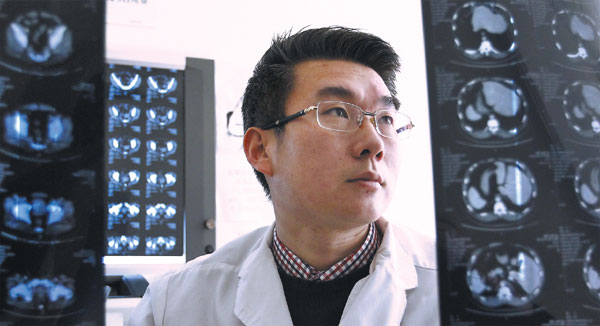Ringing the changes for circumcision
By Yang Wanli (China Daily) Updated: 2015-02-05 07:41
|
Tian Long, director of the urology department in Chaoyang Hospital in Beijing, checks an X-ray. The department performs about 1,000 circumcisions every year, and most patients opt for the Shang Ring, even though it costs 1,200 yuan ($192) to 1,300 yuan, double that of conventional surgery. Zhang Wei / China Daily |
According to Tian, another sizable patient group consists of men aged about 30 who are about to marry, and choose to have the surgery to reduce the risk of the bride contracting a bacterial infection.
Changing attitudes
Zhou Junchen, 32, opted to be circumcised at the age of 20 after reading on the Internet that the operation would reduce the risk of infection and also provide better-quality sex. "Dozens of men were having the operation that morning, and the surgeon was surprised when I lay on the operating table. He said he rarely treated younger patients who had chosen to have the surgery voluntarily for health reasons. Most of his cases involved older men with inflammations," he said.
Things have changed in the intervening 12 years, though. Zhou said young people have a more open-minded attitude toward circumcision, and want to learn more about it. "Although the benefits haven't been widely publicized in China, people now have greater access to health information. I believe people of my generation will consider this as an option for their kids," he said.
The Shang Ring has been adopted by a number of hospitals around China, and some experts believe that the growth of the market will benefit an increasing number of people, who will in turn encourage others to learn about circumcision.
"More important, the Shang Ring could vastly increase access to male circumcision in countries hardest hit by the HIV epidemic," said Cornell's Li. The significance of circumcision has already been shown in some Africa countries, because the surgery has been gradually promoted across the continent in the past decade.
In 2011, a UNAIDS report showed a decline in the number of new cases of HIV in 33 countries - 22 of them in southern Africa - between 1997 and 2010. Although medical interventions, such as the introduction of antiretroviral therapies, were the main reasons for the fall, the report said circumcision had also played an important role in the prevention of HIV and other sexually transmitted diseases.
"The Shang Ring is a great contribution that China has made to global health," said Cheng Feng, program director of the Research Center for Public Health at Tsinghua University. "Once it passes the WHO's prequalification process, the United Nations could purchase it for large-scale use in Africa, where there are so few medical staff. That could mean a lot for African countries - in the long term it could even prove to be of greater value than materials provided to support the continent as it changes. It's not just about today - it's also about the future."
Contact the writer at yangwanli@chinadaily.com.cn
- Govt encourages people to work 4.5 days a week
- Action to be taken as HIV cases among students rise
- Debate grows over reproductive rights
- Country's first bishop ordained in 3 years
- China builds Tibetan Buddhism academy in Chengdu
- Authorities require reporting of HIV infections at schools
- Typhoon Soudelor kills 14 in East China
- Police crack down on overseas gambling site
- Debate over death penalty for child traffickers goes on
- Beijing to tighten mail security for war anniversary








